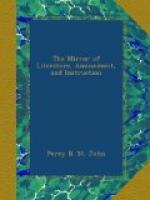and the canopy of its smoke; he loved its November
fogs, and enjoyed the music of its street musicians
and its itinerant merchants; he loved all its institutions
civil and religious; he thought there was wisdom in
them if there was wisdom in nothing else; he loved
the church and he loved the steeple, and the parson
who did the duty and the parson who did not do the
duty; and he loved the clerk and the sexton and the
parish beadle with his broad gold-laced hat, and cane
of striking authority; and he loved the watchmen and
their drowsy drawl of “past umph a’ clock;”
he loved the charity schools and admired beyond all
the sculpture of Phidias, or the marble miracles of
the Parthenon, the two full-length statues about three
feet each in length and two feet six inches each in
breadth, representing a charity boy and a charity girl,
standing over the door of the parish school; he loved
the city companies, their halls, their balls, though
he never danced at them, their dinners, for he never
missed them; and above all other companies he loved
the stationers’, and its handsome barge, and
its glorious monopoly of almanacks; he loved the Lord
Mayor and the Mansion-house,—it was not
quite so black then, as it is now,—and he
loved the great lumbering state coach and the little
gingerbread sheriffs’ coaches, and loved the
aldermen, and deputies and common-councilmen and liverymen.
Out of London he knew nothing;—he believed
that the Thames ran into the sea, because he had read
at school, that all rivers run into the sea, but what
the sea was he did not know and did not care; he believed
that there were regions beyond Highgate, and that
the earth was habitable farther westward than Hyde
Park corner; but he had never explored those remote
districts. What was Hammersmith to him or he
to Hammersmith? He knew of nothing, thought of
nothing, and could conceive of nothing more honourable,
more dignified, or more desirable than a good business
properly attended to. He was proud of the close
and personal attention that he paid to his shop,—somewhat
censoriously proud; he might be called a mercantile
prude; or shopkeeping pedant; and when a near neighbour
who had a country house at Kentish-town, to which
he went down every Saturday, and from which he returned
every Monday or Tuesday, came by a variety of unavoidable,
or unavoided misfortunes to make his appearance in
the Gazette, with a “Whereas” prefixed
to his name, Mr. Bryant rather uncandidly chuckled
and said, “I don’t wonder at it. I
thought it would end in that. That comes from
leaving things to boys.”
Much as Mr. Bryant venerated the city, and all the
city institutions, yet he was by no means ambitious
of its honours. His motives of abstinence were
of a mixed nature. He had fears that the dignity
of common-councilman, which he had occasionally been
invited to aspire to, might interfere with his domestic
comforts and put Mrs. Dickinson out of her way; and
he had some slight apprehensions that he might not
be successful if he should make the attempt; and then
as in the course of his life he had seen many promoted
to that honour, whom he had once known as children
and apprentices, and whom he still regarded as boys,
though some of them were upwards of thirty years old,
he affected to make light of a dignity that had become
so cheap.




